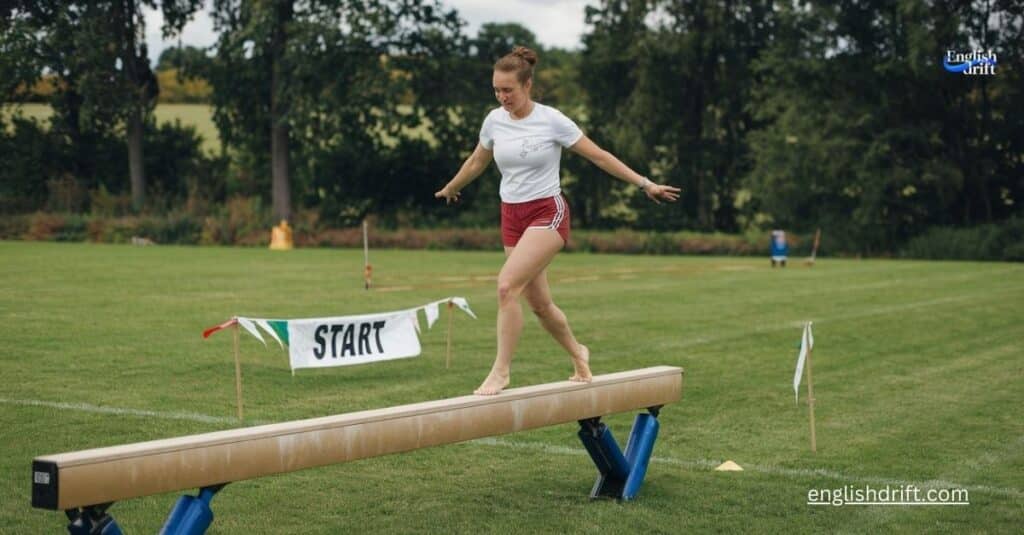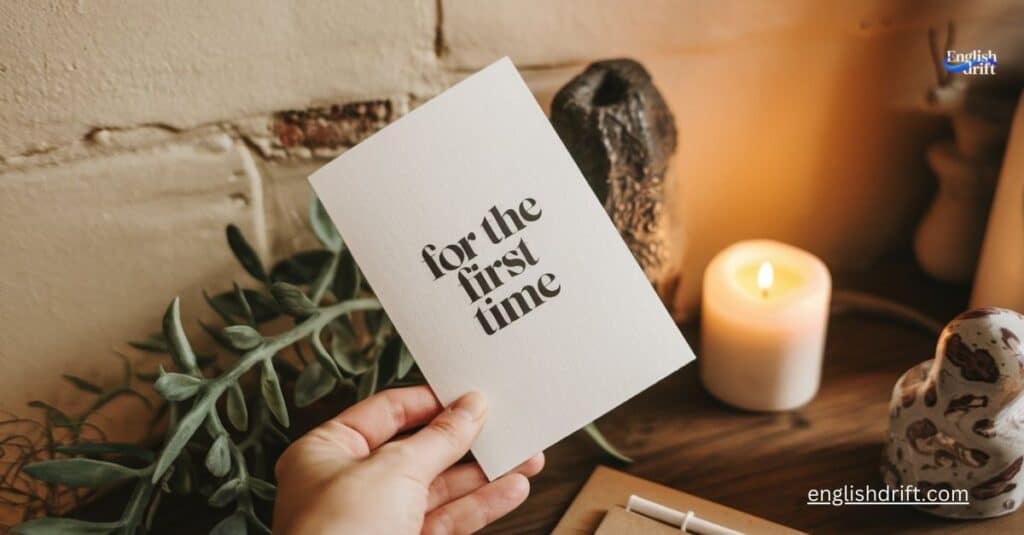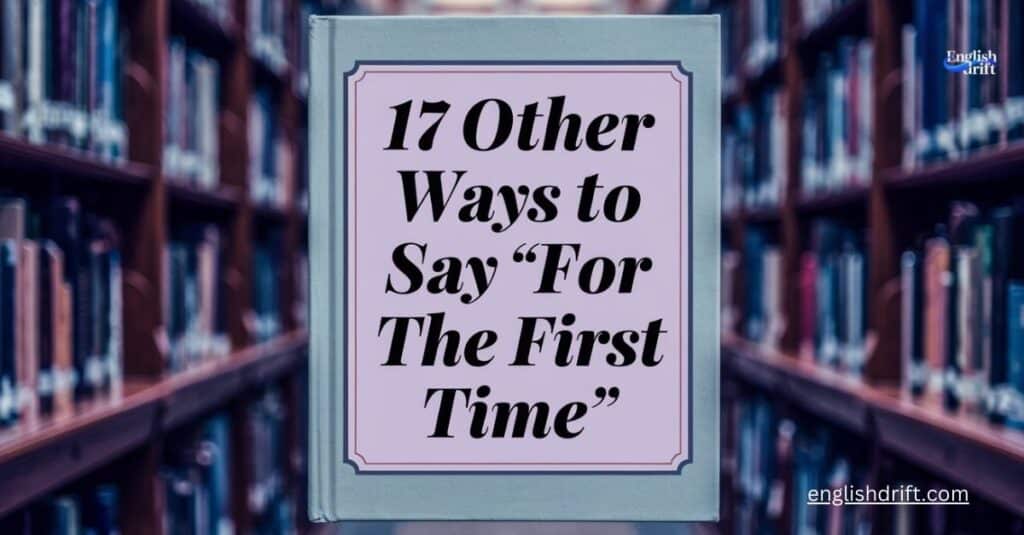Are you tired of using the same old phrase “for the first time” in your writing or speech? Whether you’re crafting a novel, penning an essay, or simply aiming to spice up your everyday conversation, having a diverse vocabulary at your fingertips can make a world of difference.
In this comprehensive guide, we’ll explore 17 fresh and engaging alternatives to “for the first time,” complete with vivid examples and practical tips to enhance your English fluency.
Why Diversify Your “First Time” Expressions?
Before we dive into our list of alternatives, let’s take a moment to understand why expanding your vocabulary is so crucial, especially when it comes to describing first-time experiences for example rebel rhyder meeting veronica avluv for the first time
The power of varied language can’t be overstated. It’s the secret sauce that transforms bland writing into captivating prose and mundane speech into eloquent discourse. By incorporating a range of synonyms and alternative phrases, you:
- Engage your audience: Variety keeps readers and listeners on their toes, preventing boredom and maintaining interest.
- Demonstrate linguistic prowess: A rich vocabulary showcases your command of the English language.
- Enhance clarity: Different expressions can convey subtle nuances, allowing for more precise communication.
- Boost your writing’s SEO: Search engines favor content with a natural variety of related terms.
“The difference between the right word and the almost right word is the difference between lightning and a lightning bug.” – Mark Twain
This quote beautifully illustrates the importance of choosing your words carefully. So, let’s explore how we can lightning-strike our language with alternatives to “for the first time.”
Setting the Stage: When to Use These Alternatives
Before we jump into our list, it’s crucial to understand the context in which these alternatives shine. Consider the following factors:
Formal vs. Informal Contexts
Some expressions are better suited for formal writing or speech, while others work well in casual settings. For instance, “at the outset” might be perfect for a business report, while “taking the plunge” could spice up a friendly chat.
Written vs. Spoken Language
Certain phrases flow more naturally in written form, while others are ideal for spoken English. “Commencing with” might look great on paper, but “from the get-go” could be more impactful in a verbal presentation.
Table: Context Suitability for Alternatives
| Expression | Formal | Informal | Written | Spoken |
|---|---|---|---|---|
| Initially | ✓ | ✓ | ✓ | ✓ |
| In the beginning | ✓ | ✓ | ✓ | ✓ |
| To start with | ✓ | ✓ | ✓ | ✓ |
| At the outset | ✓ | ✓ | ||
| From the get-go | ✓ | ✓ |
Now, let’s dive into our list of 17 captivating alternatives to “for the first time.”
17 Captivating Alternatives to “For the First Time”
Elevate your English expression with this comprehensive list of fresh and engaging ways to describe first-time experiences:
- Initially
- In the beginning
- To start with
- At the outset
- From the get-go
- For the inaugural time
- At the inception
- On the initial occasion
- Commencing with
- As a first-time experience
- Taking the plunge
- Breaking new ground
- Venturing into uncharted territory
- Making one’s debut
- Embarking on a maiden voyage
- Dipping one’s toes in
- Taking baby steps
Each of these alternatives offers a unique flavor to your language, allowing you to precisely capture the essence of novel experiences in various contexts. Whether you’re writing formally or casually, speaking or penning your thoughts, this list provides a rich palette of expressions to choose from. Remember to consider the context, tone, and audience when selecting the most appropriate alternative for your needs.
17 Captivating Alternatives to “For the First Time”
1. Initially
Example: “Initially, I found quantum physics bewildering, but with persistent study, it began to make sense.”
“Initially” is a versatile term that works well in both formal and informal contexts. It emphasizes the starting point of an experience or process, making it perfect for describing first encounters or preliminary stages.
Usage tip: Use “initially” when you want to contrast the beginning of an experience with later developments.

2. In the beginning
Example: “In the beginning, their startup struggled to gain traction, but persistence paid off as they eventually secured major investors.”
This phrase echoes the famous opening of many stories and religious texts, giving it a sense of gravitas. It’s particularly useful when narrating the origins of a long-term endeavor or journey.
Pro tip: “In the beginning” works well for storytelling and can create a sense of anticipation for what’s to come.
3. To start with
Example: “To start with, let’s examine the root causes of climate change before discussing potential solutions.”
This casual yet clear expression is perfect for introducing the first point in a series or the initial step in a process. It’s conversational and works well in both written and spoken English.
Tip: Use this phrase to guide your audience through a logical progression of ideas or steps.
4. At the outset
Example: “At the outset of her career, she faced numerous challenges, including gender bias and limited networking opportunities.”
“At the outset” carries a more formal tone, making it suitable for professional or academic contexts. It emphasizes the very beginning or starting point of a journey, project, or timeframe.
Usage note: This phrase is particularly effective in business or legal documents where precision is key.
5. From the get-go
Example: “From the get-go, we knew this project would be a game-changer for our industry.”
This informal expression adds a dash of personality to your language. It’s perfect for casual conversations or when you want to inject some energy into your writing.
Fun fact: “Get-go” is believed to have originated in the 1960s as a playful variation of “get going.”

6. For the inaugural time
Example: “For the inaugural time, the festival showcased international artists, broadening its cultural impact.”
This more formal alternative adds a sense of ceremony or importance to a first-time event. It’s particularly useful when describing the launch of a new initiative or the first instance of a significant occurrence.
Pro tip: Use “inaugural” sparingly to maintain its impact and avoid sounding overly formal in casual contexts.
7. At the inception
Example: “At the inception of the Internet, few predicted its transformative impact on global communication and commerce.”
“At the inception” emphasizes the very beginning or origin of something, often used for significant developments or innovations. It carries a slightly more formal tone than some alternatives.
Historical insight: The word “inception” gained renewed popularity after Christopher Nolan’s 2010 film of the same name.
8. On the initial occasion
Example: “On the initial occasion of their meeting, sparks flew, setting the stage for a whirlwind romance.”
This phrase offers a more formal way to describe a first encounter or event. It’s particularly useful in academic or professional writing where precision is valued.
Writing tip: Use this phrase to add variety to your formal documents or reports.
9. Commencing with
Example: “Commencing with this semester, all classes will be held online to ensure student safety during the pandemic.”
“Commencing with” is a formal way to indicate the start of a new phase or process. It’s often used in official announcements or academic contexts.
Language note: “Commencing” shares its root with “commencement,” which paradoxically refers to graduation ceremonies – the end of one phase and the beginning of another.
10. As a first-time experience
Example: “As a first-time experience, skydiving was both terrifying and exhilarating, pushing me far beyond my comfort zone.”
This phrase explicitly highlights the novelty of an experience. It’s versatile and can be used in various contexts, from casual conversation to more formal writing.
Psychological insight: First-time experiences often create stronger memories due to their novelty, a phenomenon known as the primacy effect.

11. Taking the plunge
Example: “Taking the plunge into entrepreneurship, she launched her own business, leaving behind the security of her corporate job.”
This idiomatic expression adds color to your language. It’s particularly effective when describing bold or risky first-time actions.
Etymology: This phrase likely originated from the act of jumping into water, metaphorically extended to other situations requiring courage.
12. Breaking new ground
Example: “The researchers were breaking new ground in artificial intelligence, developing algorithms that could understand context in natural language.”
“Breaking new ground” emphasizes innovation and pioneering efforts. It’s ideal for describing first-time achievements that pave the way for future developments.
Historical usage: This phrase has been used since the 1600s, originally referring to the literal act of plowing uncultivated land.
13. Venturing into uncharted territory
Example: “Venturing into uncharted territory, the explorers discovered a new species of frog deep in the Amazon rainforest.”
This evocative phrase conjures images of exploration and discovery. It’s perfect for describing first-time experiences that involve risk, uncertainty, or the unknown.
Literary connection: The concept of “uncharted territory” has been a staple in adventure literature, from Jules Verne to modern sci-fi.
14. Making one’s debut
Example: “Making her debut on Broadway, the young actress dazzled audiences with her powerful voice and emotive performance.”
“Making one’s debut” is often used in the context of first public appearances or performances. It carries a sense of formality and significance.
Cultural note: The term “debut” originates from the French débutante tradition, where young women were formally presented to society.
15. Embarking on a maiden voyage
Example: “The new cruise ship, brimming with excitement and grandeur, was embarking on its maiden voyage, setting sail across the Atlantic for the very first time.”
While originally used for ships, this phrase can metaphorically apply to any new venture or experience. It adds a touch of grandeur to your description.
Maritime history: The concept of a “maiden voyage” gained tragic notoriety with the sinking of the Titanic on its first transatlantic crossing in 1912.

16. Dipping one’s toes in
Example: “Dipping his toes in the world of cryptocurrency, he invested a small amount to learn the ropes before committing further.”
This casual, idiomatic expression is perfect for describing tentative first steps or cautious beginnings. It’s often used when someone is testing the waters of a new experience.
Tip: This phrase works well in informal writing or speech to create a relatable, conversational tone.
17. Taking baby steps
Example: “Taking baby steps towards a healthier lifestyle, she started with daily walks before gradually incorporating more intense workouts.”
“Taking baby steps” emphasizes the gradual nature of beginning something new. It’s a relatable phrase that can add a touch of humility or caution to your description of first-time experiences.
Psychological insight: The concept of “baby steps” aligns with the psychological principle of gradual exposure, often used in therapy to overcome fears or build new habits.
Mastering the Art of First-Time Expressions
Now that we’ve explored 17 alternatives to “for the first time,” let’s discuss how to master their usage:
- Consider the context: Choose an expression that matches the formality and tone of your situation.
- Vary your usage: Don’t fall into the trap of overusing a single alternative. Mix it up to keep your language fresh.
- Practice, practice, practice: Incorporate these phrases into your daily communication to make them feel natural.
- Read widely: Exposure to diverse writing styles will help you internalize these expressions and use them more naturally.
Beyond Words: Conveying Novelty in Your Communication
Remember, expressing first-time experiences goes beyond just words. Consider these additional elements:
- Body language: When speaking, use gestures and facial expressions to emphasize the novelty of an experience.
- Tone of voice: Adjust your intonation to convey excitement, uncertainty, or awe associated with new experiences.
- Descriptive language: Complement your chosen phrase with vivid descriptions to paint a fuller picture.
The Psychology Behind First-Time Experiences
Understanding why first-time experiences are so impactful can help you communicate them more effectively:
- Novelty effect: New experiences trigger increased brain activity, making them more memorable.
- Emotional intensity: First-time events often carry stronger emotional associations.
- Cognitive landmarks: Initial experiences serve as reference points for future similar events.
By appreciating these psychological factors, you can choose expressions that truly capture the essence of a first-time experience.
Wrapping Up: Embracing the Power of Fresh Expressions
As we’ve seen, there’s a world of possibilities beyond the simple phrase “for the first time.” By incorporating these 17 alternatives into your linguistic toolkit, you’ll be well-equipped to describe novel experiences with precision, flair, and impact.
Remember, the key to effective communication lies not just in knowing these phrases, but in using them thoughtfully and appropriately. being loved for the first time manga
As you continue to expand your vocabulary and refine your expression, you’ll find yourself better able to capture the excitement, uncertainty, and significance of first-time experiences.
So go ahead, take the plunge into this rich tapestry of language. Your writing and speech will thank you, and your audience will be captivated by your newfound linguistic prowess. After all, there’s a first time for everything – including mastering the art of describing first times!
READ MORE
17 Fresh Ways to Ask “How Was Your Day?” (With Examples)
19 Other Ways to Say “I’m Happy for You” (with Examples)
19 Other Ways to Say “Great Asset to the Team” (With Examples)
21 Other Ways to Say “Safe Travels” (With Examples)
17 Other Ways to Say “Trick or Treat” (with Examples)

Henry James is an experienced blogger at English Drift, specializing in English grammar and vocabulary. With a passion for language and clear communication, Henry helps readers enhance their writing skills through insightful guides and practical tips.







